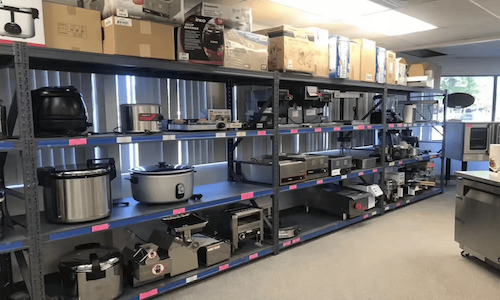When opening or upgrading a restaurant, one of the biggest financial decisions you’ll face is how to equip your kitchen. Should you buy brand-new commercial appliances, lease them, or save money by purchasing used restaurant equipment? Each option has pros and cons, and the right choice depends on your budget, the type of equipment, and your long-term business plan.
1. Buying Used Restaurant Equipment — Smart or Risky?
Used equipment can look like a budget-friendly shortcut, but it comes with serious risks.
The biggest issue is uncertainty. You rarely know how well the equipment was maintained, whether it suffered mechanical stress, or how close it is to the end of its service life. Most used appliances don’t come with a warranty, meaning any breakdowns or hidden defects are entirely your responsibility.
Some items—such as flat-top grills, fryers, deck ovens, and large mixers—can be good used purchases if they’re from high-end domestic brands and have visible maintenance records. However, avoid anything with moving parts such as slicers, toasters, or speed ovens unless you’re absolutely confident in their condition.

Refrigeration and freezing units are especially tricky. The compressor and evaporator coil are the most expensive components, and replacing them can cost almost as much as buying a new unit. Always check their market price before committing. Even if a used fridge looks fine, damaged seals, worn hinges, or poor previous maintenance can lead to constant repairs and high energy bills.
That said, some restaurateurs do take calculated risks. During tough economic times, a well-maintained used walk-in freezer or soft-serve machine sold at a fair discount might be worth the gamble—if replacement parts are still available.
In general, buy used only when the brand is reputable, parts are available, and you can inspect it thoroughly. Otherwise, what looks like a bargain could become a costly headache.
2. Buying New Equipment — The Safe but Costly Choice
Buying new commercial kitchen equipment means you get reliability, full warranty coverage, and often energy-efficient designs that save money in the long term.
A new reach-in refrigerator, oven, or dishwasher gives peace of mind knowing it meets current safety codes and performance standards.
Another often-overlooked advantage is the relationship you build with restaurant supply stores. When your business depends on fast service and an emergency replacement—like a freezer that breaks down during a weekend rush—you’ll want a supplier who knows you by name and can prioritize your needs. Being a repeat customer with a trusted supplier can make all the difference.
Although the upfront cost is higher, brand-name equipment also ensures easier repairs. Technicians often keep parts for popular models in their trucks, meaning less downtime and faster service.
Cheaper imported brands may seem attractive at first, but they can become a nightmare when you can’t find replacement parts or when the manufacturer discontinues the model right after your warranty expires.
In general, if your budget allows, buying new equipment from reputable domestic brands is the most reliable and efficient option for long-term restaurant success.
3. Leasing Restaurant Equipment — A Flexible Alternative
If your restaurant is new or cash flow is tight, leasing kitchen equipment can be a smart middle ground.
Leasing lets you use new, high-quality appliances with manageable monthly payments rather than a large upfront cost. Many leasing agreements also include maintenance or repair services, reducing your operational risks.
However, the total cost over time is usually higher than buying outright, and you don’t build ownership unless the lease includes a purchase option at the end.
Leasing works best for:
-
Short-term restaurant projects or seasonal operations
-
Businesses expecting to expand or relocate soon
-
Equipment with fast technological turnover (like POS systems or smart fryers)
In summary, leasing offers flexibility and access to premium equipment without the heavy initial investment, but it’s less cost-effective in the long run.
4. What Type of Equipment Is Safe to Buy Used?
Some categories are safer bets for used purchases than others. Here’s a quick guide:

5. Final Thoughts — Choose Smart, Not Cheap
When it comes to restaurant equipment, there’s no one-size-fits-all answer.
Used equipment can save money upfront, but buy new for reliability and efficiency, especially for refrigeration and appliances with motors. Leasing is ideal if you’re starting small or planning to expand soon.
Most importantly, build a relationship with a trusted restaurant supply partner—someone who can offer not only quality products but also fast service when things go wrong.

At Chefco, we understand how critical equipment decisions are to your restaurant’s success. From brand-new refrigeration and cooking equipment to replacement part, we help you find the right balance between cost, reliability, and performance.


